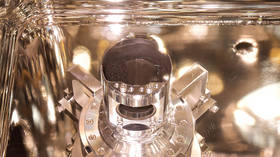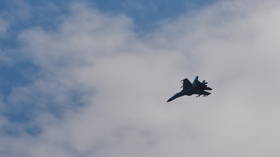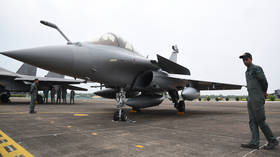‘I probably screamed’: Japanese researchers thrilled after securing Ryugu asteroid samples beyond their expectations

Japanese researchers were lost for words after asteroid samples that could shed light on the origin of life in the universe, retrieved from a space probe’s six-year operation, proved even better than they had hoped for.
The Japan Space Exploration Agency (JAXA) launched the probe, named Hayabusa2, on December 3, 2014. It was part of an 18-month mission to survey the asteroid Ryugu, 300 kilometers from Earth, and samples were returned to scientists earlier this month.
Capsule collection! The helicopter team immediately flew to the location identified by the DFS team. They searched for the fallen capsule by using radio waves and maps. Thank you very much!(Collection Team M)#Hayabusa2#はやぶさ2#AsteroidExplorerHayabusa2#HAYA2Reportpic.twitter.com/KSyEbnU3Yd
— HAYABUSA2@JAXA (@haya2e_jaxa) December 6, 2020
Researcher Hirotaka Sawada revealed that his colleagues had been hoping to secure 100mg or more of material. However, when they first opened the probe and saw the amount that had been collected in the sample, they were left speechless.
“I think that next I probably screamed, I don’t really remember. It was really different from what I expected. There was a fair amount.”
The Japanese capsule landed in a remote part of the Australian outback, near Woomera, on December 5. It was collected by the team a couple of hours after its re-entry before being flown to JAXA, outside Tokyo, for further investigation.
A large number of particles are confirmed to be in “sample chamber A” inside the collected capsule (~11:10 JST on 12/15). This is thought to be the sample from the first touchdown on Ryugu. The photo looks brown, but our team says “black”! The sample return is a great success! pic.twitter.com/34vIx17zOX
— HAYABUSA2@JAXA (@haya2e_jaxa) December 15, 2020
Scientists will now take the time to remove, examine, and weigh the samples before conducting thorough research into the materials that have been gathered. However, the discovery has got the team “absolutely thrilled,” according to Nagoya University’s Professor Sei-ichiro Watanabe, who stated that they should be able to learn a lot from this.
The team at JAXA believes the samples collected from the asteroid will help them gain an insight into the organic matter that could have contributed to life on Earth.
The sample container inside the re-entry capsule was opened on December 14, and we confirmed black grains thought to be from Ryugu were inside. This is outside the main chambers, and likely particles attached to the sample catcher entrance. (English release available tomorrow) https://t.co/NAw1R1cjvypic.twitter.com/5BfXxfH29h
— HAYABUSA2@JAXA (@haya2e_jaxa) December 14, 2020
The news from Japan follows a number of other successful space exploration missions, with NASA’s OSIRIS-REx spacecraft having collected asteroid samples and China’s lunar lander securing underground samples.
Also on rt.com Space objects getting closer: As scientists welcome samples from asteroid Ryugu, NASA sounds alarm over 5 incoming rocksLike this story? Share it with a friend!














